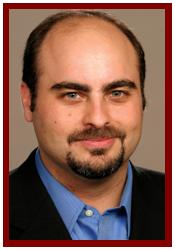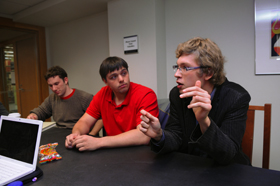 One of the paradoxes of modern life is that although we are trained to link success to our ability to reach people directly and personally, often success actually depends on the reactions of strangers whom we will never meet. Politicians live this paradox daily, as they combine the rituals of pressing the flesh with the realization of its limits. There are simply too many voters and, in our fragmented media landscape, too many potential bloggers and commentators to make a personal connection with all of them. More than one young political aspirant has begun a career with the promise that he or she will knock on every door in the district, or shake every possible hand. In the end, it is necessary, for the sake of both sanity and bodily health, to accept that universal personal contact is unattainable, and depend on the kindness of strangers, or at least the limitations of their unkindness.
One of the paradoxes of modern life is that although we are trained to link success to our ability to reach people directly and personally, often success actually depends on the reactions of strangers whom we will never meet. Politicians live this paradox daily, as they combine the rituals of pressing the flesh with the realization of its limits. There are simply too many voters and, in our fragmented media landscape, too many potential bloggers and commentators to make a personal connection with all of them. More than one young political aspirant has begun a career with the promise that he or she will knock on every door in the district, or shake every possible hand. In the end, it is necessary, for the sake of both sanity and bodily health, to accept that universal personal contact is unattainable, and depend on the kindness of strangers, or at least the limitations of their unkindness.
Academics and politicians share this paradoxical dependence on both personal contact and anonymity. In my career I have done my share of personal networking with colleagues and superiors, as well as spending hours with students—in the classroom, in office hours, and in the spaces in between—developing contacts and a personal reputation to help carve out a place in the academic world. Letters of recommendation and student evaluations, the product of such personal contact, play a significant role on the road to success. But a great deal of decisive power still lies in the hands of strangers—be they anonymous peer reviewers at journals and publishing houses, selection committees from fellowship granting foundations, or university tenure and promotion committees. Indeed, in academic life, the anonymity of those bodies is one of the few things still considered sacred. Certainly, one may be able to guess which expert in one’s field is most likely to be asked to evaluate a manuscript, or to write the external letters universities request in their tenure processes, and one may hear unofficially which senior members of the faculty happen to sit on the crucial committees. Nevertheless, it is forbidden (by custom and in some cases by rule) either to ask specifically who is making the decisions or even to see the full record of their deliberations.
Thoughtful readers can think of many reasons why this makes sense. Anonymity encourages frankness, objectivity, and the critical distance necessary to make intellectual evaluations. Indeed, anonymity is in many ways preferable to the opposite, which would have decisions made by friends and connections, which would freeze out those who are not already members of the club.
But anonymity has its decidedly chilly side as well. Strangers can be objective, but they can also view the cases before them not just on their merits but based on pre-existing assumptions, pigeonholing candidates or their works in ways that make decisions easier, but which may also miss the nuances of individual personality.
I am not a completely neutral analyst on this point. My experience with academic life, and especially the tenure process, has shown me the good and bad sides of the system. I freely admit that what success I have enjoyed thus far in my career owes a significant debt to the kindness of strangers on both sides of the Atlantic. I have also experienced the cold sting of anonymous rejection, sometimes simultaneously. It is therefore possible, for example, that one group of highly educated individuals can look at a file and vote unanimously in favor of a candidate while another group of highly educated individuals at the same institution can read the same file and reach precisely the opposite conclusion. In my case, between 2009 and 2010 my department twice voted overwhelmingly in favor of my tenure case, the university personnel committee voted no both times, and the Provost rejected my application.
Following common practice, I never received a formal written communication from a member of the administration explaining, or even announcing the ultimate decision. (Indeed, the only official university communication I received was the email from technical services reminding me return my university laptop.) This is not surprising, even it if is frustrating. Explaining the alchemy of decisions is hard. Academic bodies usually refuse to try, relying on the understanding of all participants that a detailed explanation is too intellectually and legally hazardous to attempt. For those reasons, and to give the faculty sufficient flexibility, private universities are also reluctant to be specific on their criteria for tenure and promotion, and offer no official public comment on decisions. (A position that makes practical sense, but to my mind also undermines the claim that the decisions reached are objective and unassailable. That, however, is another story.) The unspoken logic is that tenure should be hard to get, so if you do not get it, it is not a surprise, and you were not good enough, period.
I was allowed to see appropriately scrubbed versions of my dossier, but seeing that information did not provide any real clarity. Perhaps the unredacted version would make more sense, perhaps not. All I know is that people who had actually met me, and who work with me in the same general field, thought I was doing a great job and deserved to stay, while others who (as far as I know) have never exchanged a word with me, are not in my field at all, and who read exactly the same file (including exactly the same anonymous letters from external evaluators, which I am forbidden to read) decided the university would be better off without me, even though both groups claimed to base their decisions on the same principles and standards. The decisive difference, as far as I can see, was that the department, while praising my research, also placed great emphasis on the qualities that I personally brought to my work of teaching, advising, and service.
The personnel committee dismissed those qualities with a few sentences. Relying instead on cold type, the critical distance of strangers, and filtered through their own (unstated) definitions of what constituted interesting research, they implied that personal contacts were at best irrelevant and at worst a waste of time, and carried little weight in the final analysis.

Students in Prof. Granieri's thesis class meet to discuss how to react to their Professor's denial of tenure.
After the university’s original decision was known, students and colleagues protested. In person and in print, in editorials, interviews, and petitions, they appealed to the university leadership to reconsider. The university sided with the strangers’ opinions, and the preservation of the process, and rejected all appeals.
I write these lines with more sadness and bewilderment than rancor. The purpose of this post is not to challenge the system per se, since I understand its logic and respect the basic integrity of my colleagues, known and unknown. Perhaps the strangers really were more objective about my record. I don’t happen to agree with their decision, but that is not surprising. More interesting to me now is the larger question of why in such cases the opinions of strangers are considered more valuable, as if knowing less about a person is better than knowing more. We are back to the paradox I mentioned at the start. Perhaps everything we thought we knew about success is wrong, and the key may lie less in getting to know people than on keeping your distance.
I find that conclusion disturbing, to be honest, especially when reflecting on the aftermath of my experience, which suggests that distance undermines human sympathy. Reports on my case in the campus newspaper were picked up by news aggregator sites, which made for some of the most interesting Google searches I ever regret making. For, once your story is on the internet, it is open to comments from a virtually limitless community of strangers, many of whom use the luxury of anonymity to offer analyses that speak more of their own idées fixes than their knowledge of the individual case. As a result, the comments were overwhelmingly (though, thankfully, not exclusively) negative. Some declared (unrestrained by any knowledge of me, my record, university policy, or the actual documents) that my failure was obviously my fault. Others, taking the position that success with people one meets may be a bad thing, argued that student appeals on my behalf were worthless, or simply proof that I was a panderer and an easy grader. Eventually, the discussions left my case behind completely, as commenters rode off on their academic hobbyhorses in all directions. For them I was nothing but a name on a screen. That distance gave them the freedom to say whatever they liked, and little of it was sympathetic. It was fascinating and depressing in equal measure.
Politicians, recovering and otherwise, have to subject themselves to the unkindness of strangers all the time. The trick is to find a way to use such comments to help shape future plans without allowing them to unnerve, depress, or distract. I still have a lot to learn about that.









Leave a Reply